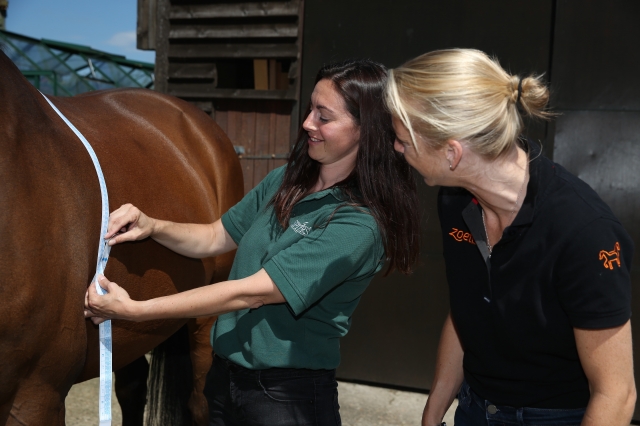
Resistance Is A Weighty Matter Says Zoetis
Are you guilty of guessing your horse’s weight rather than weighing before worming? If so you could be in danger of under-dosing says Zoetis. Under-dosing can cause worms to develop resistance to the wormers used and this can have a serious impact on how we may manage worm burdens in the future.
The British Riding Clubs Horse Health survey, commissioned by Zoetis last year, revealed that 44% of the horse owners asked do not weigh their horse before worming.1
The issue of weight was recently highlighted in some case studies from a private yard in Suffolk. Cindy is a 13.1hh Connemara mare in ‘summer’ condition. Her owner was very surprised when the weighbridge clocked her up to 380kg – a full 60kg more than was expected. Usually Cindy’s owner splits one wormer, designed for dosing a horse up to 600kg in weight, between two similarly sized ponies, which means she has been significantly under-dosing. Pop is a 16.1hh Irish Sport Horse gelding. His owner admitted that he is carrying a few surplus pounds but was shocked when he tipped the scales at 638kg. She had recently wormed him for a weight of 600kg - the maximum weight of the worming syringe she had bought. Dec is a 16.3hh Warmblood. He is lean, lithe and competition fit but still weighs in at 674kg.
Resistance to wormers is a growing problem. When a parasite population previously controlled by a drug is no longer susceptible to that drug it is known as resistance. The active ingredient of the horse wormer kills the sensitive parasites in the population, but those parasites not affected go on to create new generations of resistant parasites. Eventually, if the process continues, only resistant worms remain in the population. Frequent dosing or under-dosing can cause resistance to occur, reducing the effectiveness of the wormer.
Wendy Talbot, Zoetis vet said: “Our case studies give a very real perspective on how easy it is to under-estimate the weight of our horses. Ideally you should weigh your horse at least once a year using the accuracy of a weighbridge – several feed manufacturers offer a portable weighbridge service. Weigh tapes, although less accurate, are a great way to keep tabs on weight once you have the accuracy of the weighbridge weight to refer to and have factored in any discrepancies. Remember that many horses will change in weight throughout the year.”
Knowing the current weight of the horses that you wish to treat before purchasing your wormers can help your vet or SQP to ensure that you buy the correct dose in each case.
For further information, visit www.wormingyourhorse.info. You can also download Stable Mate, the horse health management app from Zoetis. It is available from the iPhone app store and Google Play Store: text Stable Mate to 80800 to download. (Standard network charges apply. By responding to this text you are consenting to your data being held either within or outside the EEA and processed by or on behalf of Zoetis to administer and manage any matters relating to Zoetis’s future activities or initiatives. For our full privacy policy visit www.zoetis.co.uk).
Further information is available from: Zoetis UK Ltd.,?Walton Oaks, Dorking Road, Walton-on- the-Hill, Tadworth, Surrey KT20 7NS Customer Support: 0845 3008034, www.zoetis.co.uk.
Use medicines responsibly: www.noah.co.uk/ responsible/
References
1The British Riding Clubs Horse Health Survey, commissioned by Zoetis, was completed online by 559 horse owners in the UK, during February 2014. The survey contained 21 questions on general horse health, care and management.
More from Zoetis
- 93% of horse owners would vaccinate for EHV if their vet recommended it
- Zoetis calls vets to help test groundbreaking equine health-related quality of life (HRQL) assessment tool
- Vets encouraged to engage with their farmers on the importance of orf vaccination
- Zoetis Hosts Free Webinar to Share Latest Knowledge of Lungworm
- Vets Urge Action as Dog Arthritis Misconceptions Persist

 10 years ago
10 years ago  1337 views
1337 views
 2 weeks ago
2 weeks ago 